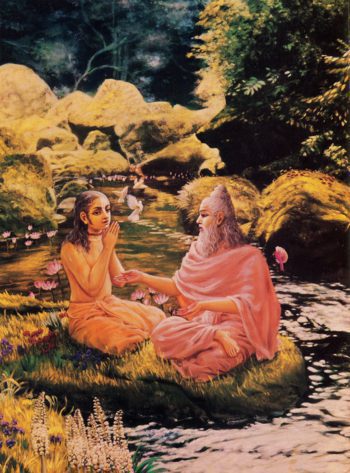There's an emphatic command in the Vedic texts
that no human being can afford to ignore.
In West Bengal, India, in 1900, twenty-six-year-old Bimala Prasada Datta, an accomplished scholar in mathematics, astronomy, and theology, was requested by his father to seek spiritual initiation from Gaurakisora dasa Babaji, a saintly yet illiterate mendicant. Hoping to avoid the distraction of an adoring public, the old saint was absorbed in chanting God's names next to the local cremation grounds.
Although the intellectual young aspirant was sincere in his request for initiation, the ascetic refused. Rebuked by his father for his repeated failure to win the favor of the great saint, a determined Bimala Prasada went to Gaurakisora dasa Babaji again: "If I do not receive your mercy, I see no need in holding on to life." Seeing the sincerity of the young man. Gaurakisora dasa Babaji accepted him as his only disciple.

Although Bimala Prasada's action may seem drastic, it was not done in ignorance. According to the Padma Purana there are 8,400,000 species of life through which the soul evolves. Only at the juncture of human life does the living entity have the ability to achieve perfection by inquiring from a spiritual master. The guru is therefore not a fad or luxury but a dire necessity. Throughout the Vedic literature the same basic message is found: "Any person who seriously desires to achieve real happiness must seek out a bona fide spiritual master and take shelter of him."
The necessity of accepting a guru is perfectly illustrated by the illusion and consequent enlightenment of Arjuna as described in the Bhagavad-gita. Despite all effort to the contrary, Arjuna found himself in the unenviable predicament of a fratricidal war. He became overwhelmed with anxiety because in good conscience he was unable to either renounce his duty as a ksatriya or fight against his relatives.
Fortunately, his frustrations led him to seek a solution by surrendering to Lord Krsna, the supreme spiritual master. "Now I am Your disciple and a soul surrendered unto You. Please instruct me."
As a result, Arjuna attentively heard Lord Krsna's instructions and at the conclusion felt a new hope and direction in life: "My dear Krsna. my illusion is now gone. I have regained my memory by Your mercy. I am now free from doubt."
Arjuna's predicament is not unique. Everyone is faced with difficulties that happen without his desire. The Vedas, therefore, comparing the world situation to a forest fire that somehow blazes without being set, enjoin that one should not remain in material perplexities but should approach a spiritual master.
Another analogy commonly used in the Vedas to help us understand the need for accepting a guru is the comparison between the spiritual master and the captain of a ship. The insurmountable ocean of material existence can be crossed by the boat of human life, which is aided by the favorable winds of the Vedas and directed by the able guidance of the spiritual master.
To fully appreciate the urgency of accepting a guru, one needs to understand something about the source of the guru's knowledge. The gurucarries a message that has been passed down in an unbroken chain of spiritual preceptors originating from the Supreme Lord, Sri Krsna, Himself. These disciplic successions are described in the Padma Purana. There are four of them: the Brahma-sampradaya, through Sri Madhvacarya; the Laksmi-sampradaya, through Sri Ramanujacarya; the Rudra-sampradaya, through Sri Visnu-swami; and the Kumara-sampradaya, through Sri Nimbarkacarya.
A disciple in a bona fide disciplic succession receives from his guru not a sermon of philosophical speculation but a potent recitation of standard knowledge, not different from the Lord's original instruction to His first disciple. The term guru therefore literally means "heavy," because of the weight of the message the guru carries.
Perfect understanding of any subject is received through authorized sources. A new lawyer becomes an apprentice to an experienced lawyer, and a young doctor becomes the intern of a licensed practitioner. TheMundaka Upanisad thus concludes. "To learn the science of God, onemust approach a spiritual master."
By Lord Krsna's method of presenting Bhagavad-gita, He also highlights the necessity of accepting knowledge from the proper authority. Although He is the original spiritual preceptor. He still supports His statements to Arjuna by informing him that "the supreme science was thus received through the chain of disciplic succession."
The principle of accepting a spiritual master is essential, and in Vedic history we find no one becoming enlightened without the mercy of a preceptor. Even the Supreme Lord accepts a guru when He appears, just to teach how to accept knowledge from the right source. Thus Lord Ramacandra, Lord Rsabhadeva, Lord Krsna, and Lord Caitanya all accepted gurus.
When Bimala Prasada expressed his feeling that he could not live without the blessings of the great saint Gaurakisora dasa Babaji he demonstrated the importance of accepting a bona fide spiritual master for enlightenment. Human life is specifically meant for self-realization, without which life has no profit.
Not only did Bimala Prasada, later known as Bhaktisiddhanta Sarasvati Thakura, apparently achieve perfection by the mercy of Gaurakisora, but by carrying the message of his guru perfectly, he became the thirty-first preceptor of the Brahma-Madhva-Gaudiya-sampradaya.
Furthermore, on his direct order, his disciple Srila A.C. Bhaktivedanta Swami Prabhupada carried the message of the disciplic succession throughout the world. We are all indebted to the young Bimala Prasada, for because of his resolve to attain the mercy of a bona fide guru, the most important instruction of the Bhagavad-gita was made available to people of all countries: "Just try to learn the truth by approaching a spiritual master. Inquire from him submissively and render service unto him. The self-realized souls can impart knowledge unto you because they have seen the truth."
